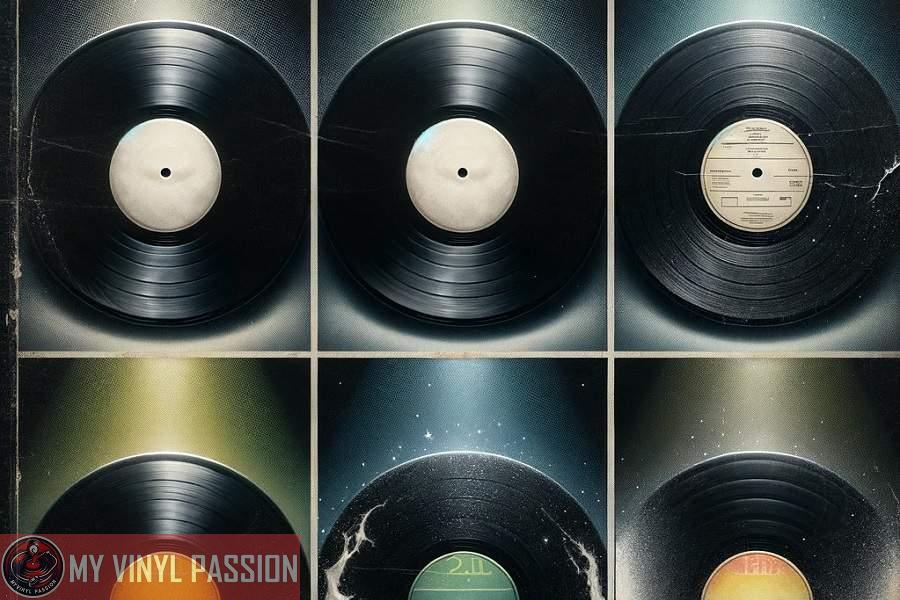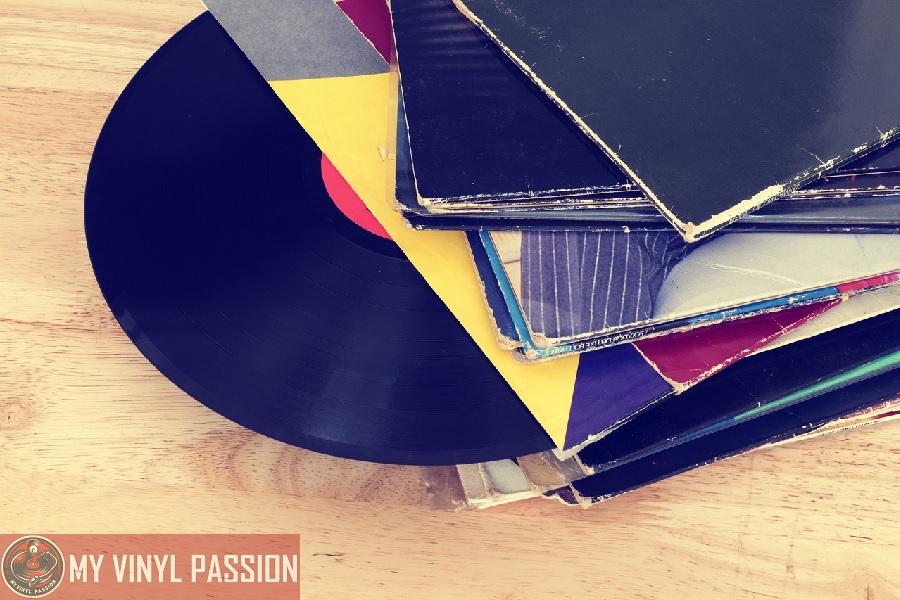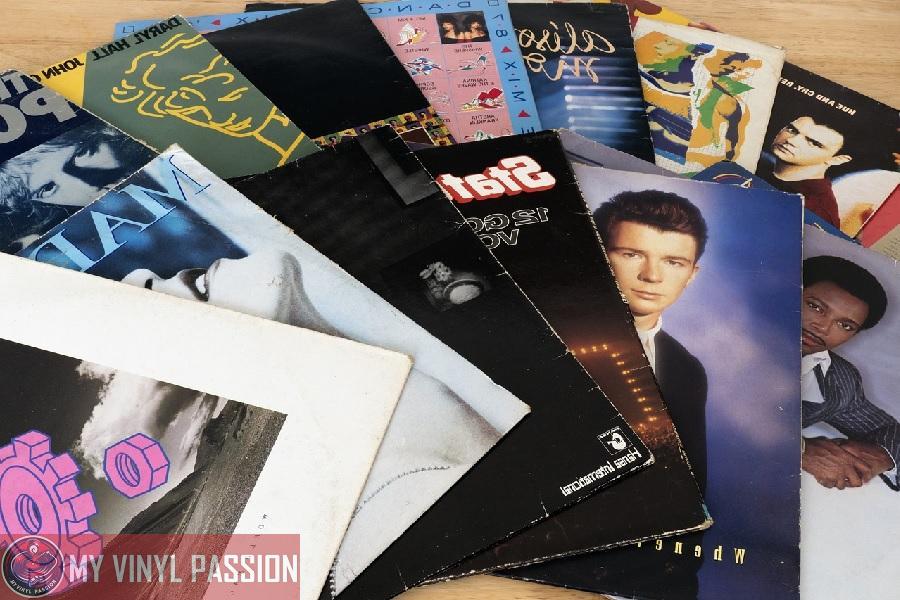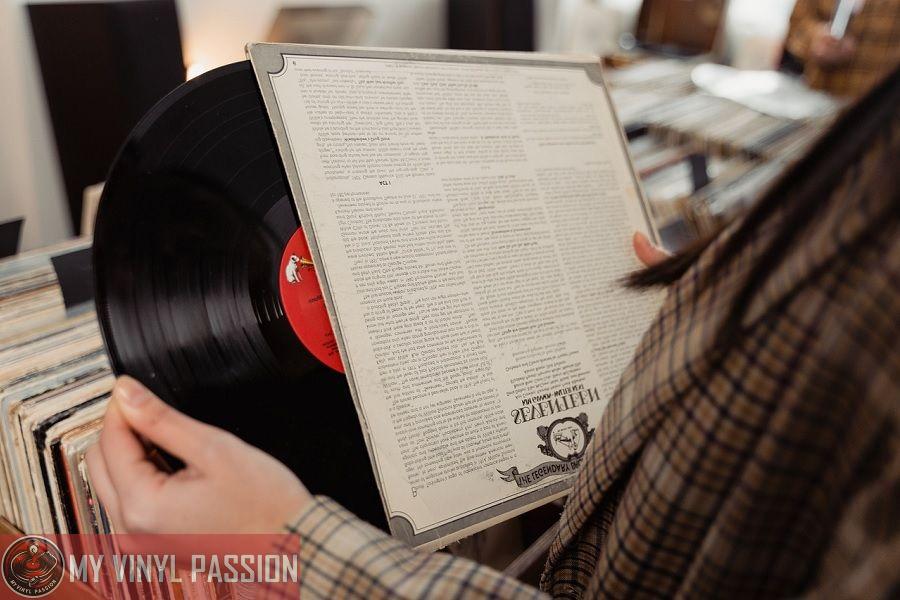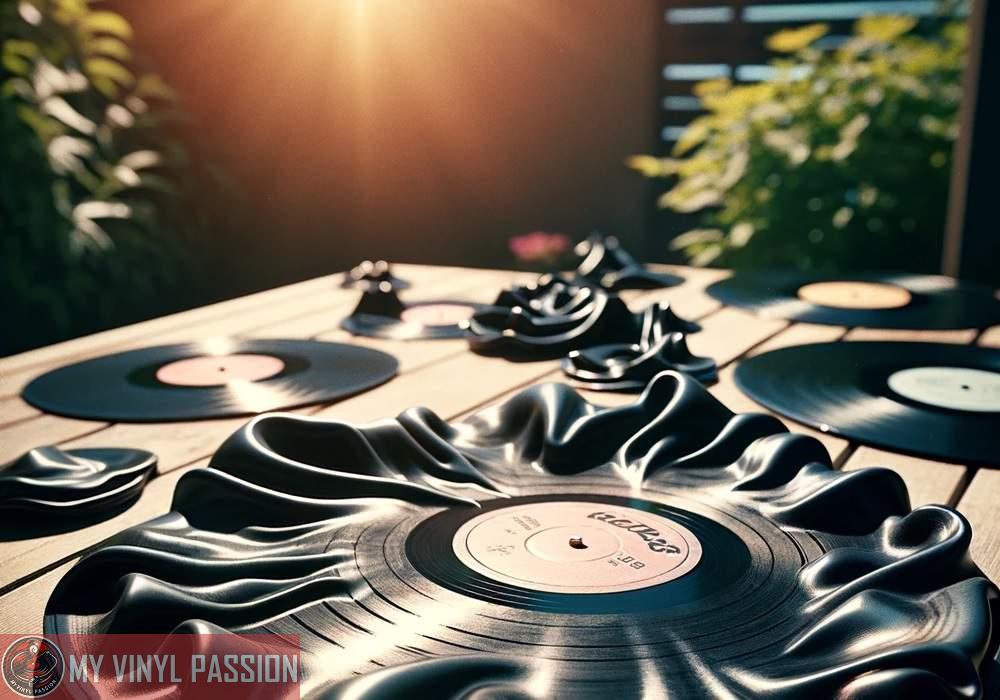Vinyl records have made a comeback in recent years, as music enthusiasts rediscover the warm, authentic sound of analog recordings.
While their popularity has surged, so has the interest in understanding the longevity of these timeless pieces of music history.
The lifespan of a vinyl record is influenced by various factors, including proper handling, storage, cleaning, and maintenance.
In Summary
Proper handling and maintenance can extend a vinyl record’s lifespan significantly.
Storage solutions and cleaning are crucial to preserving audio quality.
Be mindful of factors affecting longevity, such as temperature and humidity.
It is essential to have a general understanding of vinyl record basics and best practices for preserving the audio quality.
This will help ensure that your vinyl collection remains in top condition for many years to come. With proper care and usage, some records have been known to last for over 100 years – a testament to the potential of vinyl as a long-lasting physical medium for music.
Vinyl Record Basics
Material and Composition
Vinyl records are made of a material called polyvinyl chloride (PVC). PVC provides the durability and flexibility needed for records to be playable over long periods of time.
Vinyl records, also known as LPs, come in various sizes and speeds, commonly found in 7″, 10″, and 12″ sizes and 33⅓, 45, and 78 RPM speeds. The most classic and popular format for vinyl records is the 12″ LP, which typically contains a full album of music.
Material Properties of PVC:
- Flexible
- Durable
- Long-lasting
Compared to older formats, such as shellac records, vinyl is the superior choice not only for its durability but also for the better audio quality it offers. Shellac records, made from a combination of resin and other materials, were more brittle and prone to breakage.
Vinyl vs Other Formats
Vinyl records have a distinct advantage over other formats when it comes to sound quality and longevity. For example, CDs, MP3s, and streaming services provide a compressed digital audio format, while vinyl records offer an analog format that retains more of the nuances found in the original audio recording.
This often leads to a richer, warmer sound that many music enthusiasts prefer.
Pros of Vinyl Records:
- Rich, warm sound
- Collectible format
- Tangible, physical medium
- Large cover art
However, vinyl records also have some disadvantages when compared to digital formats. They are bulkier and require more care and maintenance. Additionally, playing vinyl records requires a turntable, which can be expensive and take up space in your home. Lastly, vinyl records are more susceptible to damage if not properly stored and handled.
Cons of Vinyl Records:
- Bulky format
- Requires turntable
- Prone to damage if mishandled
Overall, vinyl records can last a long time when properly cared for, creating a unique listening experience and offering a physical connection to your favorite music.
Proper Handling and Usage
Playing the Record
To ensure the longevity of your vinyl records, it’s essential to follow the proper steps when playing them on your turntable. First, make sure your turntable is set up correctly and the stylus (needle) is in good condition.
A worn-out or damaged stylus can cause damage to the grooves of your records, so it’s crucial to replace it periodically.
Place the record on the turntable platter, making sure it’s clean and free from dust or debris. Gently lower the tonearm and align the stylus with the lead-in groove. Avoid adding excessive pressure to the tonearm, as it can also harm the records.
Handling Precautions
When handling vinyl records, it’s vital to avoid touching the surface directly with your fingers. Fingerprints can leave oils and dirt on the surface, which may affect the sound quality and eventually damage the grooves.
Always hold the records by the outer edge or the label area, and consider wearing clean cotton gloves to minimize the risk of transferring oils and dirt.
Be cautious when removing the record from its sleeve and storing it back after playing. Slide the record in and out smoothly, without rubbing it against the sleeve, to avoid scratches and other damage.
Proper Storage: To maintain the lifespan of your vinyl records, store them vertically and away from direct sunlight, excessive heat, and high humidity levels. This helps prevent warping and other damage.
- Temperature: Ideal storage temperature is around 65°F (18°C).
- Humidity: Keep the storage area at a relative humidity of 45-50%.
By following these guidelines, you can protect your vinyl records and ensure they last for generations to come.
Cleaning and Maintenance
Record Cleaning
A clean vinyl record not only improves its sound quality but also extends its lifespan. To remove dust and dirt from your records, it’s essential to use a soft-bristle brush designed explicitly for vinyl records.
Routine Cleaning:
- Lay your record on a clean, flat surface.
- Gently brush the surface in a circular motion, following the grooves.
- Use a microfiber cloth to remove any remaining debris.
For a deeper clean, you can use a wet-cleaning solution specifically made for vinyl records. Simply mist the record lightly with the solution and wipe it down using a microfiber cloth.
This method helps eliminate smudges, fingerprints, and fine scratches that can cause playback issues like crackling, popping, and skipping.
Stylus Care
A well-maintained stylus is critical for preserving your vinyl records and record player, and it should be cleaned two to three times a month, depending on usage.
Materials:
- Soft-bristle brush (specifically designed for stylus cleaning)
- Cleaning solution (optional)
Cleaning Process:
- Using the soft-bristle brush, gently brush the stylus from the back to the front, removing dust and debris.
- For stubborn contaminants, consider using a stylus cleaning solution. Place a couple of drops on the brush and repeat the cleaning process.
By maintaining a clean record collection and a well-cared-for stylus, you can significantly improve the quality of your listening experience and prolong the life of your vinyl records.
Storage Solutions
Environmental Factors
To ensure the longevity of your vinyl record collection, it’s crucial to store them in a controlled environment. Keep your records away from extreme temperatures and protect them from excess humidity.
The ideal storage temperature is between 65 to 70 degrees Fahrenheit (18°C – 21°C). In addition to temperature, avoid exposing your records to direct sunlight, which can lead to warping and fading of the artwork.
Organizational Tips
Here are some organizational tips to help maintain the quality of your collection:
- Storage Techniques: Use dedicated vinyl storage units such as crates, cabinets, or shelves specifically designed for records. These units will provide proper support and prevent pressure damage.
- Positioning: Store your records vertically, never stack them horizontally. Horizontal stacking can cause warping and damage from excess pressure.
- Protection: Use appropriate inner and outer sleeves to guard your records from dust, dirt, and other potential contaminants.
- Labeling: Label your storage units for easy access and reference. This will make browsing your collection easier and more enjoyable.
By following these guidelines and maintaining a well-organized, controlled environment, you can extend the life of your vinyl records and preserve their sound quality.
Factors Affecting Longevity
Physical Deterioration
The lifespan of vinyl records depends on how well they are handled and stored. Physical deterioration such as scratches, wear and tear, and warping can significantly reduce their lifetime.
Proper storage is essential in extending the longevity of your records.
- UV exposure: Prolonged exposure to sunlight can cause warping and distortion to your vinyl records. To avoid this, store them away from direct sunlight or in a cool, dark place.
- Humidity: High humidity levels can promote mold growth and cause damage to the grooves of your records, affecting their sound quality. Ensure that your storage environment maintains a consistent humidity level.
- Handling: Always handle your records with clean hands and touch only the edges. Dirt and oils from your fingers can lead to groove wear and affect the playback quality.
Equipment and Playback
The quality of your equipment has a direct impact on the lifespan of your vinyl records. Using quality record players and taking care of them is essential in maintaining your records’ longevity. Here are some tips for minimizing equipment-related wear:
- Turntable: Ensure your turntable is well-maintained, regularly cleaned, and properly calibrated. Adjust the tracking force, anti-skate, and cartridge alignment to avoid unnecessary friction on the grooves of your records.
- Stylus: The stylus is the needle that comes into contact with the grooves of your records, and its condition directly affects the wear on your vinyl. Regularly inspect it for damage and replace it as needed to prevent excessive wear and tear on your records.
- Record cleaning: Invest in a quality record cleaning system to remove dust, dirt, and other contaminants from your records’ grooves. Regular cleaning will minimize friction during playback and extend the lifetime of your vinyl.
By keeping these factors in mind and taking proper care of your equipment and records, you can significantly prolong the lifetime of your vinyl collection.
Avoiding Common Damages
Scratches and Warping
To maintain the quality and longevity of your vinyl records, it’s vital to avoid common damages like scratches and warping. Scratches can occur when your records are mishandled, so always hold them by the outer edge or the label.
Be cautious when placing the record onto the turntable, as dropping it can cause scratches as well.
To prevent warping, store your vinyl records vertically and avoid stacking them. Make sure they are kept in an environment with consistent temperature and humidity levels.
High humidity can damage your records by causing mold and mildew to grow, while fluctuations in temperature can lead to warping.
Here’s a summary to help you avoid damaging your records:
- Hold records by the outer edge or label
- Store records vertically, not stacked
- Maintain consistent temperature and humidity levels
Sunlight and Temperature
Exposure to sunlight and extreme temperatures can greatly reduce a vinyl record’s lifespan. Ultraviolet (UV) rays from sunlight can degrade the quality of records, causing the grooves to become distorted, and negatively affecting sound quality. To prevent this, keep your vinyl collection away from direct sunlight.
Similarly, fluctuations in temperature can cause warping and other problems.
Ideally, vinyl records should be stored in a temperature-controlled environment between 65°F and 70°F (18°C to 21°C). Extreme temperatures, either hot or cold, can lead to irreversible damages, so it’s crucial to keep your records in a stable environment.
Keep these points in mind to protect your records from sunlight and temperature damage:
- Avoid exposure to direct sunlight
- Maintain a temperature-controlled environment (65°F to 70°F)
- Keep your records away from heat sources or cold drafts
Enhancing and Preserving Audio Quality
Record Player Setup
To ensure the best audio quality, it’s crucial to set up your record player correctly. The main components to focus on are the cartridge, counterweight, and tonearm.
A high-quality cartridge makes a significant difference in the sound quality of your vinyl records. Invest in a good cartridge to ensure accurate audio reproduction and to minimize wear on your records (source).
Next, adjust the counterweight to achieve the proper tracking force for your specific cartridge. This ensures the stylus makes optimal contact with the record grooves, enhancing the sound quality and preserving your vinyl records.
The tonearm alignment is equally important, as it affects the tracking accuracy of the stylus. Incorrect alignment puts unnecessary stress on your records and may lead to distortion or audio imbalance.
Vinyl Record Care
The lifespan and audio quality of your vinyl records highly depend on proper care and preservation. Under the right conditions, vinyl records can last up to 100 years or more.
Here are some essential steps to follow:
- Clean your records: Regularly clean your records to remove dust, dirt, and fingerprints. Use a carbon fiber brush before each play, and deep clean with a record cleaning solution, as needed.
- Store them correctly: Store your records vertically in a cool and dry place. Avoid direct sunlight, as UV exposure can damage them. Maintain a consistent temperature and humidity level to prevent warping. Use protective outer sleeves and inner sleeves to keep your records safe.
By following these guidelines in setting up your record player and caring for your vinyl records, you can enjoy excellent sound quality and prolong the lifespan of your collection.
The Future of Vinyl Records
Market Trends
In recent years, vinyl records have experienced a resurgence in popularity, particularly among audiophiles who appreciate the warmth and nostalgia associated with analog sound.
This renaissance has led to a significant increase in vinyl record sales, with some pressing plants being backed up with orders until 2023. As your vinyl record collection grows, it’s important to understand how market trends may impact their value and longevity.
- Continued growth: The demand for vinyl records is not showing signs of slowing down anytime soon, offering ample opportunities for both new and seasoned collectors.
- Digital competition: While vinyl records offer a unique experience, the accessibility and convenience of digital recording formats may moderate the market growth.
- Niche appeal: Despite competition from digital formats, vinyl records are expected to maintain their niche appeal among die-hard enthusiasts and audiophiles.
Technological Advancements
As the vinyl record market grows, so too do the advancements in production and materials. To ensure the longevity and enjoyment of your collection, it’s essential to stay updated on the latest developments.
- Recycled vinyl: With an increasing focus on sustainability, some production plants have started using recycled vinyl materials. This not only reduces waste but may also result in records with enhanced durability.
- Improved production methods: While traditional manufacturing methods are still popular, new technologies may increase production efficiency and improve sound quality. For example, some plants have begun experimenting with 3D printing to create vinyl records, which could potentially yield faster production times and lower costs.
- Advancements in playback: Innovations in turntable technology and speaker systems continue to enhance the vinyl listening experience. Not only can this breath new life into your existing collection, but it may also attract new enthusiasts to the world of vinyl records.
By staying informed about market trends and technological advancements, you can make the most of your vinyl record collection and ensure that this beloved format continues to thrive.
Frequently Asked Questions
What is the average lifespan of a vinyl record with proper care?
With proper care, a vinyl record can last an impressive 100 years or more. However, various factors like UV exposure, high humidity levels, and improper handling can significantly reduce a record’s working years.
How many times can a vinyl record be played before its quality degrades?
There is no specific number of plays that guarantees degradation, as it depends on how well you maintain your records. However, using high-quality turntable equipment and setting the correct tracking force can minimize wear and prolong the lifespan of your records.
Can the quality of sound on a vinyl record deteriorate over time?
Yes, the quality of sound on a vinyl record can deteriorate over time due to various factors such as dust accumulation, exposure to sunlight, and improper storage. It’s essential to properly clean and store your records to maintain their sound quality.
What factors contribute to the wearing out of vinyl records?
Several factors contribute to the wearing out of vinyl records, such as improper handling, exposure to sunlight, high humidity levels, dust accumulation, and using damaged or worn-out equipment to play them. Proper storage and handling can help mitigate these factors and prolong the lifespan of your records.
How can you properly maintain a vinyl record to maximize its longevity?
To maximize the longevity of your vinyl records, it’s essential to keep them clean, store them vertically in a cool and dry place away from direct sunlight, and use high-quality turntable equipment. Additionally, handle your records by the edge and label area to avoid touching the grooves and causing any damage.
What are the common mistakes to avoid when handling vinyl records?
Some common mistakes to avoid when handling vinyl records include touching the grooves with your fingers, using damaged or worn-out equipment, exposing them to direct sunlight or high humidity, stacking them horizontally, and not cleaning them regularly. By avoiding these mistakes, you can help ensure your records remain in good condition for many years.
